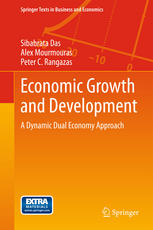

Most ebook files are in PDF format, so you can easily read them using various software such as Foxit Reader or directly on the Google Chrome browser.
Some ebook files are released by publishers in other formats such as .awz, .mobi, .epub, .fb2, etc. You may need to install specific software to read these formats on mobile/PC, such as Calibre.
Please read the tutorial at this link: https://ebookbell.com/faq
We offer FREE conversion to the popular formats you request; however, this may take some time. Therefore, right after payment, please email us, and we will try to provide the service as quickly as possible.
For some exceptional file formats or broken links (if any), please refrain from opening any disputes. Instead, email us first, and we will try to assist within a maximum of 6 hours.
EbookBell Team

0.0
0 reviewsGrowth theory provides a rich and versatile analytical framework through which fundamental questions about economic development can be examined. This book is an introduction to the newer features of growth theory that are particularly useful in examining the issues of economic development. Structural transformation, in which developing countries transition from traditional production in largely rural areas to modern production in largely urban areas, is an important causal force in creating early economic growth, and as such, is made central in this approach. Towards this end, the authors augment the Solow model to include endogenous theories of saving, fertility, human capital, institutional arrangements, and policy formation, creating a single two-sector model of structural transformation. Based on applied research and practical experiences in macroeconomic development, the model in this book presents a more rigorous, quantifiable, and explicitly dynamic dual economy approach to development. Common microeconomic foundations and notation are used throughout, with each chapter building on the previous material in a continuous flow. With its single model and focus on data and policy analysis, this text is intended for beginning graduate students and policy makers interested in economic development.